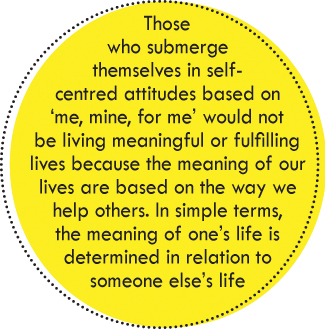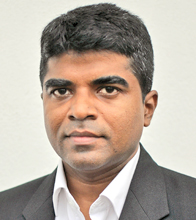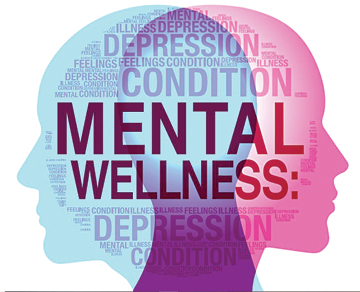
According to recent data of the Department of Statistics, in comparison to March 2022, by April 2022, the monthly expenditure of a family unit in Sri Lanka had risen by Rs. 5,672. Expenditure for food rose by Rs. 3,345 and non-food expenditure by Rs. 2,327.
 Even though there is no exact data available as to the current situation, all of us are experiencing the exponentially rising cost of living. If a four-member family unit is considered, Rs.100,000 is barely sufficient to cover even the essential expenses.
Even though there is no exact data available as to the current situation, all of us are experiencing the exponentially rising cost of living. If a four-member family unit is considered, Rs.100,000 is barely sufficient to cover even the essential expenses.
Needless to say this predicament creates stress and anxiety for many and could result in adverse behavioural consequences which are harmful to individuals and communities.
Therefore it is imperative to ensure psychological resilience and well-being in order to cope up with many challenges which come our way on a day to day basis. In order to gain understanding on how we could navigate this situation effectively, we interviewed consultant psychiatrist and senior lecturer in Psychiatry, Faculty of Medical Sciences, Sri Jayawardenapura University, Dr. Jayamal de Silva.
Q: In your opinion, who is suffering most due to economic crisis?
A. This is an unfortunate and harsh situation for all of us but those who live below the poverty line suffer the most. People experience difficulties in diverse ways according to each one’s circumstances. For example, nowadays, someone who commutes to work in a car could be more stressed than another who commutes on a bicycle. I usually travel to work in my car and because of the fuel crisis if I had to ride a bicycle to work that would cause me some amount of suffering.
However, there could be an incomparable economic disparity between the one who rides a bicycle to work and the one who drives a car. The one who rides a bicycle could be a daily wage earning labourer whose economic situation is far worse than that of the person who drives the car to work.
Therefore, we need to understand that this crisis is not just an economic one but depends on socio-cultural factors as well. We can see that from the way each person comprehends the situation and that is also why most are under immense pressure.
Q: Could mental stress cause physical illnesses?
 Consultant psychiatrist and senior lecturer in Psychiatry, Faculty of Medical Sciences, Sri Jayawardenapura University, Dr. Jayamal de Silva |
A. Mental stress is not an illness. During a crisis or a conflict anyone is susceptible to stress. However, if stress increases or becomes more severe, then it is possible for it to cause deterioration of mental and physical well-being. For example, severe stress could cause insomnia, loss of appetite, high blood pressure or high blood sugar levels. The immunity system could also weaken.
Q: What could be done to reduce stress or anxiety caused by the crisis?
A. The crisis in Sri Lanka is not going to be resolved soon. It will remain for a significant period of time. Therefore, it is very important to understand that looking for violent, short sighted, short term solutions would not make life easier for us. We need to accept that there would be many changes and challenges which we would have to face and that we need to tackle them in an organized, well-considered, far-sighted manner.
However, I like to stress that Psychological Science is not equipped to provide solutions for economic or social crises. For example, ‘Positive Thinking’ cannot diminish starvation. At the same time negative or depressive thinking patterns also would not help us cope up with the economic crisis.
As such it is important to understand how one views or comprehends the crisis. That is where positive thinking is needed. For example, this situation affects the education system very adversely. If students find it difficult to attend school, there would be no point in them wasting their time lamenting about not being able to get to school or for tuition classes.
Instead they could use the time effectively to study the text books or do revision at home. As almost all of us are now well versed with online platforms such as Zoom or Whatsapp, those platforms could be used for group study sessions, etc.
However, for some others positive thinking at this time could be impractical. If a person is unable to feed her child or send the child to school, she could be severely stressed or anxious.
We do not have the right to ask such a person to think positively but at the same time negative thinking would not be of any use either for that person. We need to be able to accept the reality and have the resilience and the flexibility to change our attitudes according to the situation. At least that would enable us to spend the remainder of our lives in better mental and physical health.
We need to understand that just as contentment or happiness is not constant, nor is suffering. Everything changes and nothing lasts forever. If we could train ourselves to view the world with these attitudes then it is much easier to survive any crisis.
 Hopefulness is also extremely needed. Most people question why they need to continue to live in a situation like this. Some say that there is no reason for them to go on living.
Hopefulness is also extremely needed. Most people question why they need to continue to live in a situation like this. Some say that there is no reason for them to go on living.
Those who submerge themselves in self-centred attitudes based on ‘me, mine, for me’ would not be living meaningful or fulfilling lives because the meaning of our lives are based on the way we help others. In simple terms, the meaning of one’s life is determined in relation to someone else’s life. Therefore, hopefulness is also determined in relation to the lives of others.
A good example to describe this would be the story of the Jewish Psychiatrist Victor Frankl who lived in Vienna, Austria during World War II. Victor Frankl wrote a book ‘The Man’s Search for Meaning’ which could form the basis for this discussion.
The book tells the life story of Victor Frankl when he was imprisoned in a Nazi concentration camp, how he survived the horrendous experiences and somehow preserved his life.
Victor Frankl says that, however, atrocious and horrendous their lives were at the camp, that all the prisoners who lived till the end of war, had the will to go on living to see the end of the war. All of them were hopeful that they would survive and would eventually be able to leave the camp to live freely and happily. According to Frankl, it was this positive thinking pattern that enabled the prisoners to survive their ordeal.
We get to see many who are angered easily and excessively. Most think that their anger is caused by external factors such as someone else or some occurrence. However, Victor Frankl in his book introduces a theory that ‘between stimulus and a response, there is a space’. The way that space is identified, understood and used is resultant on how we respond to situations.
For example, if we consider the recent murders in Sri Lanka, we need to understand that punishing someone for a wrongdoing is different to killing someone out of anger and aggression. There were ordinary people who suffered because of these incidents.
There is reason to believe that propagation of violence via social media was integral to this kind of aggression. However we need to be constantly conscious of how we respond to a situation as individuals.
 We also need to be aware and cautious of the national and international forces which aim to destroy our societal structure, cohesion and discipline. Their intention would be to somehow create a collective consciousness which is detrimental to our well-being.
We also need to be aware and cautious of the national and international forces which aim to destroy our societal structure, cohesion and discipline. Their intention would be to somehow create a collective consciousness which is detrimental to our well-being.
As such we need to make an effort to develop broader and deeper understanding of the problems and their causes and see that ‘I am not the only person who has to go through this.’
It is possible to use the traditional stress management methods and techniques as well. For example, we need to avoid news broadcasts, Facebook posts or WhatsApp messages which constantly and continuously convey information which causes negativity.
Instead of wasting time on such things, we could go for a walk, listen to calming music, do some gardening or engage in something creative. These activities could help us in retaining a positive mindset at least momentarily.
We also need to be cautious about how we manage our finances: how we keep our expenditure lower than our income. I used to drive my car to work daily. However due to the current fuel crisis it is difficult for me to find adequate fuel.
Therefore, I need to consider whether I could ride a bicycle to work. Except for the fear of being hit by a large vehicle, I do not see why I could not ride a bicycle to work.
The last method I would like to propose is not alien to our culture. Meditation need not be just a religious practice. Whatever our religious beliefs may be, we could set aside some time daily for meditative practices. Meditation could help retain mental well-being and also develop mental abilities.
Q: What are the things we should refrain from doing to reduce stress?
A. Psychological research has revealed that the more time one spends on social media or in front of a television, the less happy that person would be. Therefore we must attempt to avoid electronic media as much as possible.
It is also very important to remember that the use of substances such as cigarettes, alcohol, cannabis, etc could cause stress and also increase stress levels. Most believe that these substances could reduce stress but this is a myth. None of these substances are capable of stress reduction. Instead they only contribute to the reduction of well-being and happiness.
Lastly we need to remember that whatever we may think or do as individuals, if we act in ways which break the connections we have with others, if we lose sight of the fact that we need to stay together as a society, if we think and act selfishly, then all of us would be heading towards a worse predicament than we are already in.
Translation: Asela Abeywardene
